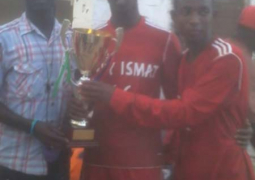SOS Regional Mothers and Adult Training Centre (RMATC) in Bakoteh on 4 May 2012 held its 4th graduation ceremony at the skills centre on the theme “Standing together to serve the vulnerable”.
At the ceremony 35 students graduated of which 19 were certified on social work and 16 on catering and hotel management.
Speaking on the occasion, Fanta Bai-Secka, Director of Social Welfare, said the Gambia government through the Ministry of Health “appreciates the efforts of SOS Kinderdoff International Regional office for North and West Africa (SOS KDI NWA) for providing the training opportunity for the young people.
She said the agency’s intervention is a way of complementing the efforts of the Department of Social Welfare.
“This is an evident of private-public partnership, which the government is earnestly promoting in all ramifications,” she said.
Fanta Bai-Secka added that the Gambia government conceptualizes the vision of a social welfare service well before the attainment of independence, saying to this effect the social welfare department started its operations in 1947 in the country.
She also said that its mission statement aims to protect, assist and empower the vulnerable groups in the Gambian society through the promotion and provision of welfare services.
In 1962 the department was attached to the Ministry of Labour and Employment but was later moved to the Ministry of Education and finally to the Ministry of Health and Social Welfare where it has been till today.
Madam Secka said the objectives of the department are to assist individuals, families and groups to resolve imbalance between them; to assist vulnerable people and ensure that justice prevails at all time, and to identifying potential areas which may be causing such imbalance in order to prevent their occurrences.
The three organizations agreed to collaborate to provide the training locally, she said, adding: “It is their combined efforts that brought us here today to the fourth graduation.”
Mrs Bai-Secka also said her ministry recognizes the effort of these organizations and promises to continue to give them all the necessary government backing to enhance their service delivery to the people of the country.
Agnes Campbell, who stepped in for the chairperson of the SOS Social Work and Advisory Board, said the SOS was founded in 1949 in Imst in Austria as a childcare social organization to address the prevailing need of children displaced during the second world war.
The SOS operates as an NGO and the founder, Hermann Gmeiner, saw the plight of the children and was moved to contribute something meaningful to their lives, Agnes said.
To facilitate this process, Agnes noted, a children’s village concept was developed with recruitment of women who shared the vision to be mothers and aunties to this “adopted” children.
She added that every other project or department from kindergarten to clinic was formed to support this vision of their leaders and they work with government departments like social welfare, local government authorities, community-based organizations, NGOs, civil societies, biological families of the children, etc in pursuance of this idea.
Madam Campbell also said the SOS Regional mothers and adult training centre was formed to build the capacity of mothers and aunties while ensuring continuous quality delivery of their services, in their drive to gain recognition for the SOS Mothers profession.
It is expected that, in partnership with the UTG, the SOS students would be given the chance to move to a higher level.
She also said that after the diploma level at the UTG, the students as at date are unable to move further in development and are appealing to the UTG to expedite the process of commencing bachelor’s degree programme in social work in the country.
In her welcoming remarks, Ellen Maraizu, director of SOS RMATC, said the regional mothers and adult training centre was founded in 1999 at the instance of the SOS KDI in The Gambia with the overall aim of building the personal and professional capacities of SOS mothers and aunties in the North-West African sub-region.
She said their SOS mothers and aunties are trained in the centre to provide care for their SOS children.
Mrs Maraizu added that the Gambian society is in transition and thus “the extended family system is no longer sufficient to address the needs of the vulnerable groups in our midst and SOS KDI is aware of this and is standing to this challenge”.
She further stated that they consider it an obligation to not limit this training to their organization but to share it also with the nation at large.
The other speakers on the occasion included Foday Jaiteh, who gave the valedictory speech, while the closing remarks were delivered by Naida Gomez and Mr Halifa Sallah.


